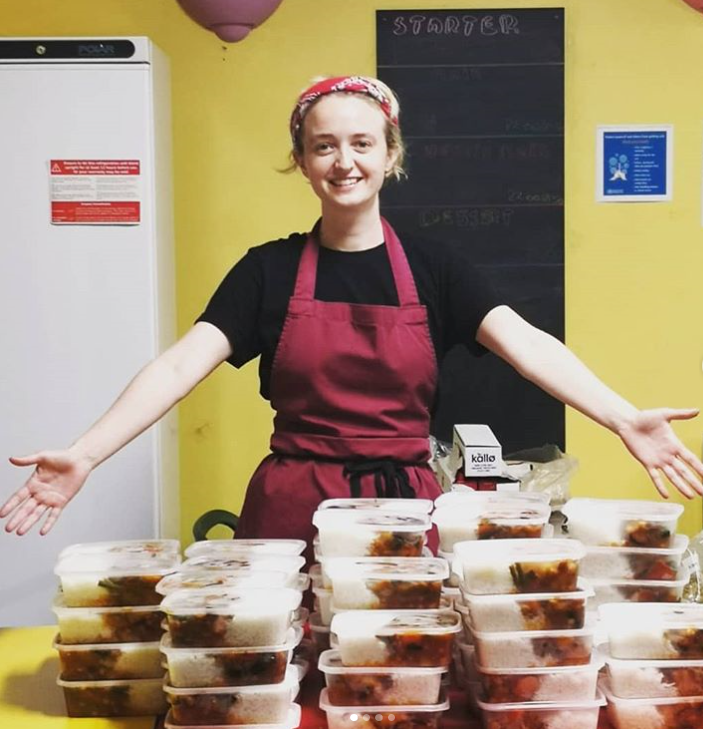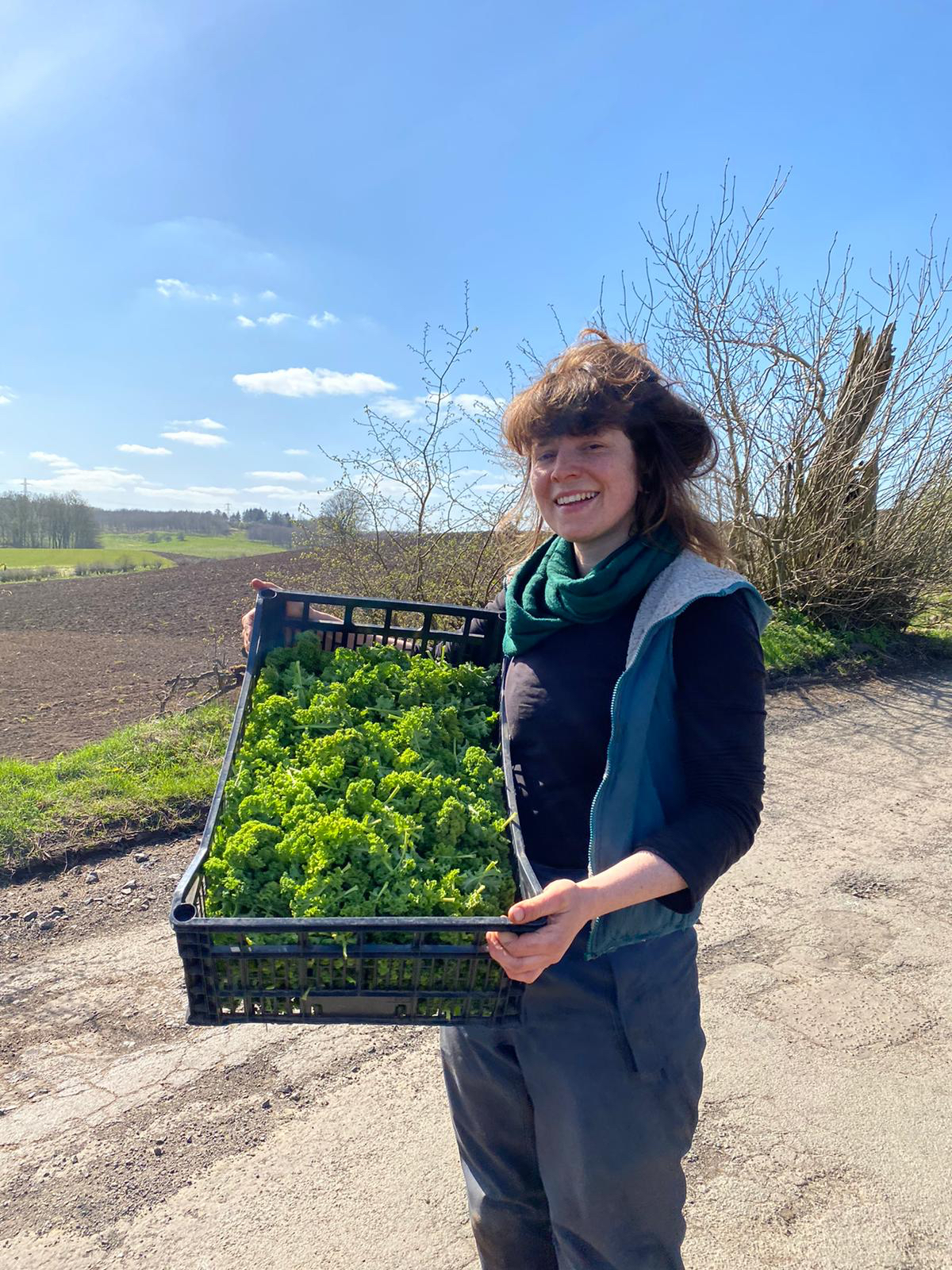

All corners of the Glasgow food scene have come together to help the city’s residents get through the Covid-19 crisis. The UK’s ‘friendliest city’ is responding in kind. “People in Glasgow are really friendly and that’s been heightened in this moment all the more.” - Riikka Gonzalez, Sustainable Food Places Coordinator for Glasgow
Quickly after lockdown the Glasgow Community Food Network (GCFN) took the lead in bringing partners together to deliver a community food response that highlights the city’s generous and collaborative spirit. In addition to being at the frontline of emergency food aid and supporting other key actors, the Glasgow Food Policy Partnership is gathering learnings for this crisis to inform the Glasgow City Food Plan to make it fit for the future.
Glasgow Food Policy Partnership (GFPP) is a group of public, private and voluntary sector organisations who have come together with one specific objective. It believes that a fairer, healthier, more sustainable and resilient food system would make Glasgow an even better city to live in.
The city’s emergency food response is coordinated by a newly established coalition called Food for Good Glasgow (FFGG), mirroring other Food for Good coalitions in other Scottish cities including Aberdeen and Edinburgh. Glasgow’s coalition includes Glasgow Community Food Network, GFPP, Strath University Food Sharing, Slow Food Glasgow, community workers and volunteers. The group works strategically offering community organisations support with supplies and logistics.
GFPP, supported by Sustainable Food Places Co-ordinator Riikka Gonzalez, is taking the role of connecting and supporting local groups involved. FFGG have compiled a database of 150 organisations and groups involved in the local response, and are in touch regularly to offer or request support around resources, volunteers and food. GFPP is also liaising with the Council, disseminating the latest health advice from their Public Health colleagues, and helping build a more coordinated approach.
Glasgow City Council and Glasgow Council for Voluntary Services (GCVS) have set up a central triage hub called Glasgow Helps, which includes an online directory of support and a phone help line. The GCFN and other members of the GFPP have assisted in the development of the this support pathway by reducing any duplication in the system, and bringing on more volunteer power, including local chefs who are keen to help.

Meanwhile, GFPP is continuing to work behind the scenes on the Glasgow City Food Plan. 60 organisations are involved in shaping the plan, some of which are coming to the fore as a result of Covid-19. While in person consultations have had to be postponed, the working group is continuing to gather input from various stakeholders, and aim to publish the draft plan for public consultation later this year. While continuing this work during the Covid crisis has been challenging, with many organisations involved directly in emergency responses, the plan will undoubtedly be shaped by Covid-19 experiences, and will help rebuild and strengthen the local food system in the longer term. Some elements, such as the section on the local food economy, will need to be transformed as a result of this year’s events.
Other parts of the Plan will reflect the closer partnerships and collaborations that have developed out of this difficult time. GFPP is working more closely with the community sector at a grassroots level, which is helping us to better shape the Plan.
Riikka reflects: “The new learnings about heightened food insecurities and adverse effects of the COVID-19 on local food businesses demonstrate the importance of building a more resilient and fairer food system that is fit for Glasgow’s future. After all, supporting the local food economy and everyone working in it should be a long term goal for our friendly city.”

“There are so many great projects helping out, it’s a job just to keep track of them all.” - Riikka Gonzalez, Sustainable Food Places Co-ordinator, Glasgow Food Policy Partnership
The Council is coordinating food parcels for shielded or clinically vulnerable people, as well as administering emergency funds. Glasgow’s Community projects have stepped up to support people not entitled to direct statutory help, making sure fewer people in desperate circumstances are left out. A number of projects have been set up anew, or have pivoted to work on food for the first time. A list of projects offering help can be found on the GCFN and Glasgow Helps websites, but here are a few examples:
Urban Roots is updating and adding to its free food finder map all projects offering free food support in the city, allowing people a quick and accessible way to find the support they need.
Meals Collective is an enterprise, set up by a chef originally looking to open a restaurant this year, providing free or pay as you feel healthy meals for individuals and via community groups, including culturally diverse menus.
Glasgow City Mission switched to delivering food to 600 homeless people around the city after it had to close its day centre.
G20 Youth Festival has shifted its focus to provide a community meals on wheels service run by young people.
Refuweegee are supporting people with contact-free deliveries of essentials and family-focused supplies, and offer help in multiple languages.
Interfaith Glasgow is utilising its network of faith groups supporting each other with resources and food, who are often able to quickly utilise smaller quantities of food other projects cannot.
FARE based in the Easterhouse of Glasgow is a North East partnership supported by various local organisations and providing large number of meals weekly.
Castlemilk Community are a collective of local organisations working together to reduce the impact of food insecurity in the area.
Locavore veg box scheme has been donating produce to local projects providing food parcels and cooked meals, in addition to other generous work supporting the local food response (please see the funding section).
Food Train, a charity linking older people with volunteers to help with household chores, errands and meal-sharing has ramped up their food shopping, food parcel and meal delivery work.
Glasgow Mutual Aid network is supporting self-isolating people with food and prescription shopping support, as well as cascading advice and information and hosting virtual social activities for members.

In addition to food businesses and enterprises stepping up to support people in need, local businesses themselves are being supported by FFG Glasgow, GFPP and the wider public community to keep going during the crisis.
FFG Glasgow are preferencing local businesses wherever possible when ordering food in bulk, including buying produce from Locavore to go into food bank parcels, and buying from local whole foods wholesalers. The emergency food WhatsApp group allows projects to quickly access redistributed food to meet their food needs using their collective knowledge.
The three local hubs of the of the Great British Food Hub network are keeping busy offering online deliveries and supporting local food businesses and farmers to keep trading.

Funding the community response
GCFN received funding from Scottish Government’s ringfenced food support funding to set up the FFG Glasgow Emergency Food Network to fund operations and food sourcing.
Community projects have covered other shortfalls and l waiting periods to receive charity funding, through crowdfunding and local residents’ generous spirits.
Locavore’s Good Food Fund scheme has been focused to give local projects quick and easy access to smaller funding amounts to support their emergency responses. Support from veg box customers and the general public has poured in, and Locavore has put forward £5000 of its own money to fund FFG Glasgow.

Glasgow’s local flavour
Consistently voted as one of the friendliest cities on earth, Glasgow’s generous spirit and collaborative energy shines through these uncertain times. Trust and collaboration have been quickly established and strengthened between organisations, allowing the city to quickly pivot and focus its efforts on supporting people struggling to access food during the Covid-19 crisis.
Riikka says, “Everyone has been chipping in. Lots of communities are coming together, wanting to volunteer, to help in any way. Even projects that are short of food are offering anything they can to help others. And The University of Glasgow has offered their storage space, vans and even furloughed staff to help with FFGG operations”
GFPP has been working with various partners towards a more sustainable food system in Glasgow since 2014.The development of the Glasgow City Food Plan emerged after Glasgow City Council’s Food Inequality consultation the end of 2018. This highlighted the deep food inequalities that exist and how interlinked they are with other pressing issues faced by the city. These were reinforced further at Glasgow’s Food Summit in May 2019 (organised collectively by GFPP, Glasgow Centre for Population Health and GCC) at which we gathered intelligence to inform our work on the Glasgow City Food Plan. Glasgow’s involvement in COP26, now postponed, has further highlighted the relationship between our food system and environmental sustainability . As the city emerges from the Covid-19 crisis, and rebuilds and recovers, the strong relationships that we have developed will provide a solid foundation for our work to ensure a resilient food future for Glasgow.